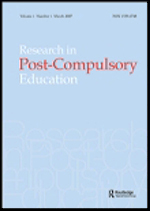NEETs research featured in lead journal
Thu, 28 Feb 2013 15:28:00 GMT
Huddersfield researchers to edit special issue of Research in Post-Compulsory Education
 WITH youth unemployment reaching record levels around the world, two University of Huddersfield researchers have edited a special edition of a major academic journal in which international experts examine the phenomenon and suggest strategies. A key theme which emerges is that joblessness among the young is a global issue, which can only be tackled by a multi-faceted change in economic policy.
WITH youth unemployment reaching record levels around the world, two University of Huddersfield researchers have edited a special edition of a major academic journal in which international experts examine the phenomenon and suggest strategies. A key theme which emerges is that joblessness among the young is a global issue, which can only be tackled by a multi-faceted change in economic policy.
Professor Robin Simmons (top) and Dr Ron Thompson (pictured below) are working alongside Dr Lisa Russell on a £124,000 research project, funded by the Leverhulme Trust, into the lives of UK young people who are described as NEET – not in education, employment or training. This was one of the factors which led to an invitation to the two lecturers to produce a special edition of the journal Research in Post-Compulsory Education.
 Eventually, the sheer number and quality of academic papers submitted meant that Professor Simmons and Dr Thompson persuaded the publishers to produce a double issue of the journal. It is now published, and sub-titled Reclaiming the Disengaged: Critical Perspectives on Young People Not in Education, Employment or Training (pictured below).
Eventually, the sheer number and quality of academic papers submitted meant that Professor Simmons and Dr Thompson persuaded the publishers to produce a double issue of the journal. It is now published, and sub-titled Reclaiming the Disengaged: Critical Perspectives on Young People Not in Education, Employment or Training (pictured below).
“The journal has 12 papers from eight different countries, so it offers a real international perspective,” said Professor Simmons.
In addition to UK contributors – including the University of Huddersfield’s Dr Liz Atkins – the special journal has articles from experts in Australia, New Zealand, South Africa, Finland and Estonia. Contributors are based at some of the leading universities in their countries.
Concerns about youth unemployment
 Professor Simmons and Dr Thompson have provided an introduction to the journal in which they set the scene. Unemployment among young people is now at levels “without modern historical precedent”, they write. In the UK almost one in four 16-24 year-olds are out of work and the situation is more severe in many other nations, such as Ireland, Spain and Greece.
Professor Simmons and Dr Thompson have provided an introduction to the journal in which they set the scene. Unemployment among young people is now at levels “without modern historical precedent”, they write. In the UK almost one in four 16-24 year-olds are out of work and the situation is more severe in many other nations, such as Ireland, Spain and Greece.
The economic crisis that began in 2007 had served to increase the numbers of young unemployed, but – according to the two editors – “this has merely exacerbated more long-term and deep-rooted patterns of social change”.
“Although there have been significant changes in the way it has been conceptualised, there have been ongoing concerns about youth unemployment in the UK and elsewhere since the 1970s.”
Common threads
 Pictured with Dr Lisa Russell (top) is Dr Liz Atkins, both from the University of Huddersfield.
Pictured with Dr Lisa Russell (top) is Dr Liz Atkins, both from the University of Huddersfield.
The articles published in the special edition of Research in Post-Compulsory Education vary in their approach, said Professor Simmons.
“Some are focussed on particular initiatives in certain national contexts, such as training programmes or government policies. Others are focussed on broader theoretical debates about issues of disengagement and marginalisation, using key thinkers to intellectualise or problematise the whole area,” he explained.
But there are some common threads, he added. “One is that the issue of NEET or marginalised young people is seen as part of a global agenda.  The temptation is just to focus on your own country, but actually unemployment rates among young people are related to broad shifts in the political economy related to globalisation. We have an international problem.”
The temptation is just to focus on your own country, but actually unemployment rates among young people are related to broad shifts in the political economy related to globalisation. We have an international problem.”
It also emerges that any targeted initiative to try and help young people would need to be augmented by broader political and economic initiatives, said Professor Simmons.
“Any one scheme will not work on its own. There is no magic wand. There needs to be a range of different policies to help unemployed young people. This is a long term, deep-rooted problem that requires a significant shift in ideas and economic policy if governments are serious about addressing it.”
- ‘Reclaiming the Disengaged: Critical Perspectives on Young People Not in Education, Employment or Training’ is a special issue of Research in Post-Compulsory Education, Volume 18, Issue 1-2, 2013. http://www.tandfonline.com/toc/rpce20/current







